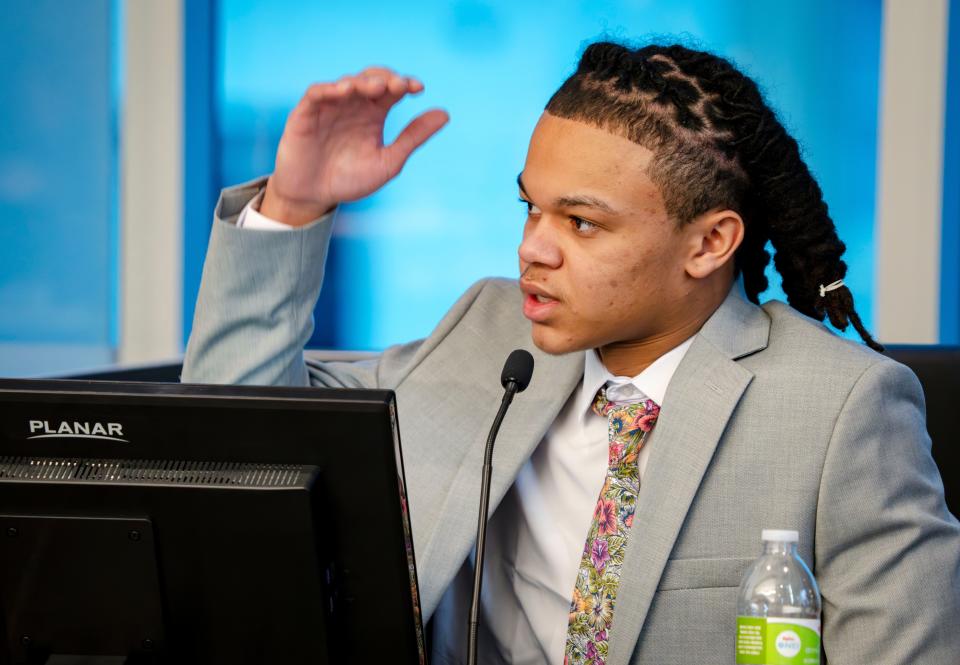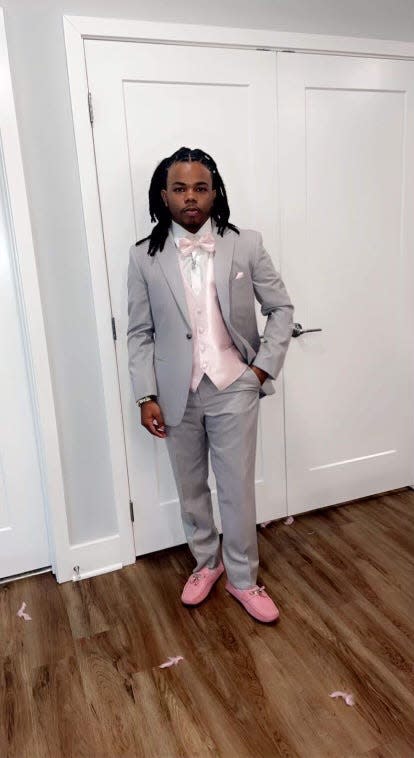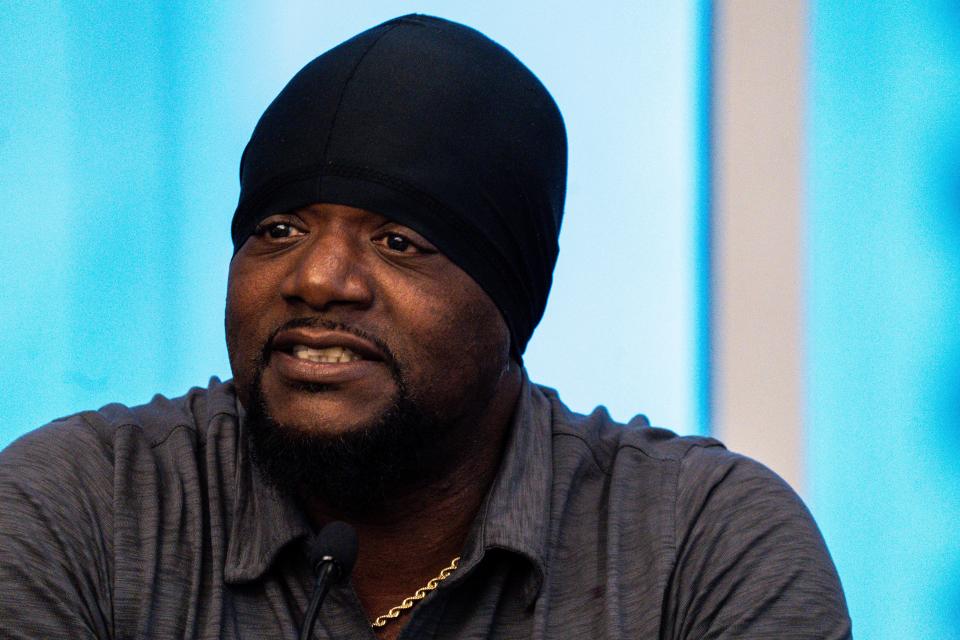Juror in Starts Right Here school shooting trial: Prosecution didn't prove gang involvement
One of the jurors who delivered a second-degree murder verdict for the teen who shot and killed two students at a Des Moines alternative school in January told the Des Moines Register in an exclusive interview that the jury didn't buy prosecutors' argument that the killing was gang-related.
Preston Walls, now 19, also was convicted Sept. 14 of voluntary manslaughter and assault in the Jan. 23 shooting deaths of Rashad Carr, 16, and Gionni Dameron, 18. But the jury did not find Walls guilty of more serious first-degree murder charges and acquitted him of criminal gang participation and of attempted murder in the wounding of William Holmes, also known as Will Keeps, the founder of the Starts Right Here education program, where the shootings occurred in a downtown office park.
More: Why we granted anonymity to juror in article examining Starts Right Here shooting verdict
Throughout the two-week trial, prosecutors and police argued that the shooting was part of an ongoing gang dispute that had led to numerous other shootings in Des Moines. They said Walls targeted Carr and Dameron because they and their gang, Only My Brothers, or OMB, had publicly disrespected his gang, known as Only The Real or Strap Gang.
The Register is not identifying the juror at the person's request, including referring to the juror's gender. The juror said that while the jury found the shooting was not justified, it largely agreed with the version of events put forwarded by Walls' defense attorneys: that he shot Dameron and Carr because he believed they were going to shoot him, and was afraid for his life.

"I mean, it was an interesting theory," the juror said of the alleged gang connection, but "they didn't prove it beyond the shadow of a doubt."
Prosecutors are now preparing to try a second alleged gang member, accused getaway driver Bravon Tukes, for his role in the shootings. Jury selection in his trial begins Monday.
What makes a gang member? Jury wanted better answer
Prosecutors in the trial presented extensive evidence, much of it in connection with the testimony of Des Moines police Detective Jeff George, that showed Walls and other reported gang members brandishing guns, flashing gang signs and talking about gang activity on social media.
But when the defense pressed George on what evidence he uses to characterize individuals as current or former gang members and associates, George refused to identify any firm criteria, saying at one point that "it’s not one single determination, it’s the whole totality of the individual.”
The juror said that response didn't land well in the jury room, and that during deliberations the jury saw a distinction between being a gang member and acting like one on social media.
"He couldn't define what makes someone a gang member, and in the end, we are left with the impression that what makes someone a gang member is Detective George with Des Moines police decides that they're a gang member," the juror said. "We have no doubt that these people associated with gangs, maybe some friends from childhood, some family members, but we didn't see any evidence other than pictures, really, of kids being stupid."
Did Preston Walls' actions before shooting suggest plan?
Prosecutors cited Walls' gang connections as the motive for the killing. In particular, they said a rap video by Carr and other OMB members had inflamed tensions in the week before the shooting, and that text messages between Walls and Tukes on the morning of the shooting showed them planning the attack.

Previously: Starts Right Here shooting linked to teen's killing by Des Moines police, court records say
But jurors were struck by other text messages Walls sent that morning about a job interview he was excited about, as well as the hours he spent before the shooting with teachers, working on an essay, the juror said. Walls knew the school had video cameras and would have known he had little chance to escape identification if he conducted a planned shooting in such a high-profile location, the jury reasoned.
"If your plan is you're never going to graduate from the school because you're going to perpetrate a shooting, why bother with the essay?" the juror asked.
The job interview texts were significant not only because they showed Walls making plans for a time after the shooting, suggesting he hadn't already decided to carry it out, but also because the state did not include them in its exhibits, leaving the defense to bring them up, the juror said.
"Detective George destroyed his credibility with that," the juror said. "They should have handled the whole morning texts better, because now we're questioning what's [George's] motivation. It's basically him saying, 'I present the facts that prove my case.' Well, what about the truth?"
No sign Gionni Dameron or Rashad Carr threatened Preston Walls that day, jury concluded
So if not to kill rival gang members, why did Walls shoot Carr and Dameron? Jurors credited Walls' testimony that he was afraid for his life, the juror said.
Walls said on the stand that he'd previously been shot in an incident that he believed involved Dameron, and been shot at on another occasion by Carr. He testified he'd been assaulted at work by another OMB member, and that there had been a verbal confrontation with Dameron and Carr outside Starts Right Here two weeks before the shooting.

The jury didn't see evidence of a threat from Dameron or Carr on the day of the shooting, but the juror said given that history, it wasn't unreasonable for him to be fearful.
"The impression was that he had been carrying a gun to school, he knew Gionni was carrying a gun to school, and at some point in that day, something happened that made him decide he had to kill these two kids," the juror said. "We never really got a clear understanding of why. Even watching the video, you can see him get worked up, but there wasn't any clear threat from Rashad or Gionni."
The juror emphasized that none of the jurors believed Dameron or Carr had provoked the attack.
"I want to be clear about that. They did not deserve to be shot. No one's arguing that whatsoever," the juror said. "... I would like the families to know that we didn't think their kids, Gionni or Rashad, were some sort of vicious gang member or violent person. We definitely didn't view it that way."
Jury saw shootings as not self-defense, but not premeditated
Walls' attorneys argued that, since he was afraid for his life, the shootings were justified self-defense. The jury convicted him anyway, although not of the most serious murder charge.
The jurors chose second-degree murder for Carr's shooting because, in light of the essay-writing and job interview texts, they felt the state hadn't proven the shooting to be premeditated, the juror said. Still, the jury found that because Carr was unarmed, and because Walls shot him without warning, his actions amounted to murder, the juror said.
Before the shooting, Walls removed a GPS ankle monitor he'd been ordered to wear for a previous offense. The juror noted that jurors did not consider that action to be evidence of premeditation, a requirement of a first-degree murder conviction. The jurors instead considered that a sign that he feared he would have to defend himself and might be in danger from police responding to the school afterward, the juror said.
Asked to comment on the juror's account of the jury's reasoning, Bob Rigg, a Drake University law professor who leads the school's Criminal Defense Clinic, said that courts have held that even instant decision-making may amount to premeditation.
"Premeditation has to exist either prior to or at the time of the incident, but it can happen instantaneously," he said. "It just depends on the facts of the case and how the jurors perceive those facts."
Still, he said, jurors are instructed they are free to believe some, all or none of the evidence presented, and can come to their own conclusions about what a defendant decided to do and when.
Factors that weighed against the jury finding the shootings were justified, the juror said, were that Walls had left the room where Dameron and Carr were, but chose to come back and confront them. Jurors also considered that the manner of the shooting, in which Walls fired 30 bullets while running back and forth between the two injured teens, showed him using much more force than was needed to end any perceived threat.
Jury nearly deadlocked on Gionni Dameron shooting
The harder decision, the juror said, was what to do about the shooting of Dameron, who had a gun in his waistband when he died. Several jurors argued strenuously to acquit Walls for Dameron's shooting, to the point that on the morning of Sept. 14, after nearly two days of deliberation, the jury considered telling the judge it was deadlocked.
Instead, the juror said, the jury was able to set that issue aside and work through other charges, which helped break the logjam on Dameron with a guilty verdict on a charge of voluntary manslaughter.
"The voluntary manslaughter came about because in the instructions it allowed for someone responding in a violent passion. And we felt that that's what he had done, even though it wasn't self-defense, that he'd basically gotten so worried and worked up that he got himself in this fiery passion," the juror said, adding that if Dameron had been unarmed, the verdict likely would have been second-degree murder for his death as well.
Why did the jury acquit Preston Walls of attempted murder in shooting Will Keeps?

Jurors found Walls not guilty of attempted murder for shooting Keeps, although they convicted him of a lesser charge of assault causing serious injury.
Although prosecutors suggested Keeps might have been an intended target, the jury believed he had been wounded by accident while Walls was shooting at Carr, the juror said.
That still could have amounted to attempted murder under the legal theory of transferred intent, which holds that defendants are responsible for crimes they try to commit against one victim, even if another victim is actually affected. The jury instructions included guidance on transferred intent, but the juror said that, because jurors convicted Walls of second-degree instead of first-degree murder for shooting Carr, they didn't think transferred intent applied.
"Our understanding from the instructions was the transferred intent applied to the first-degree murder charge," the juror said. "If it applied to the second-degree murder charge, we must have misunderstood."
Rigg, who reviewed the jury instructions for Walls' case, said transferred intent can be applied to a variety of charges, frequently including attempted murder.
"Someone shoots at A and intends to hit A, but hits B, and B does not die, then yes, transferred intent would come into play," he said. "Transferred intent can apply to other crimes besides homicide. Attempted murder is the classic example."
The jury sent the judge at least one note during deliberations requesting clarification on the instructions, although the judge did not read the question in court and it's not clear if it involved the transferred intent question. After consulting with the attorneys, the judge responded by telling the jury to reread the instructions.
Juror sees 2 deaths, Will Keeps' injury, Preston Walls' imprisonment as 'so senseless'

The main takeaway from the case, the juror said, was that none of this had to happen.
"You have Will Keeps, who is an awesome community member with what he does with the school and that program. He's been shot," the juror said. "You've got Gionni and Rashad dead for essentially no reason. And you have this kid who was 19, and he's spending 30, 40 years in prison. There's no way to feel good about this all around."
Tempers flared at times during deliberations, the juror said, and some members felt ganged-up on by fellow jurors.
"People think it's so black and white, but there were so many shades of gray to everything," the juror said. "And it was all so senseless, just completely senseless."
Several jurors were in tears when they finally returned to court to present their verdict, the juror said, but ultimately they believed their verdict was the right one.
"I feel I think we all felt like we did what justice required of us, what the law required of us, but I think we all felt a lot of negative emotion about having such a young person put away for so long," the juror said.
Attorneys for both Walls and the state declined to comment on whether they spoke with any jurors after the trial. Walls is scheduled to be sentenced Nov. 8 and faces decades in prison. Tukes, his codefendant, could face life in prison if convicted of first-degree murder in his upcoming trial.
William Morris covers courts for the Des Moines Register. He can be contacted at wrmorris2@registermedia.com, 715-573-8166 or on Twitter at @DMRMorris.
This article originally appeared on Des Moines Register: How jury reached Starts Right Here shooting verdict: Exclusive interview

